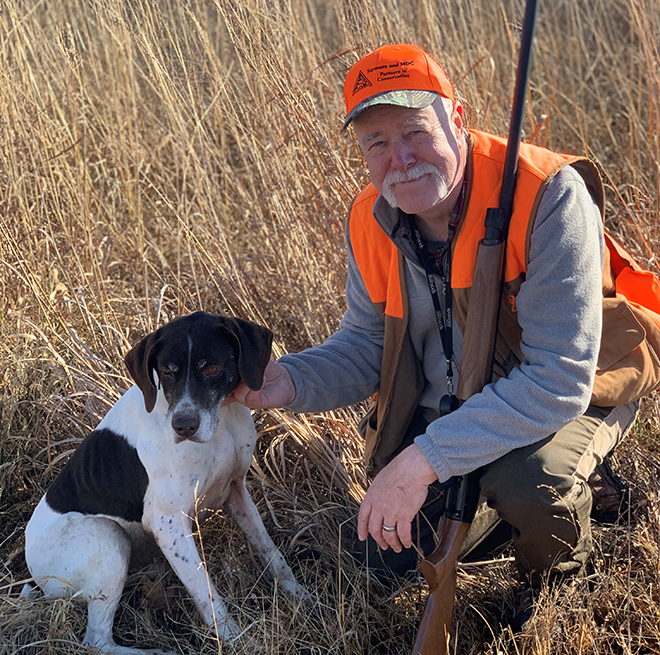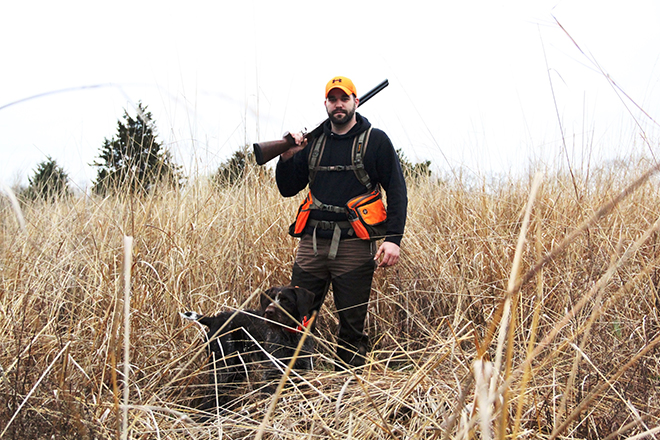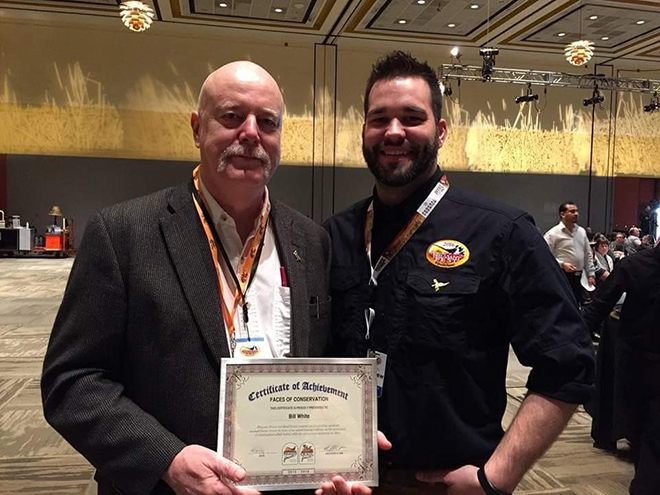By Bill and Andrew White
Bill and Andrew White are a father and son conservation team who both work in the state of Missouri, Bill as a long-time employee of the Missouri Department of Conservation, and Andrew as a Farm Bill biologist for Pheasants Forever and Quail Forever. This is their story.
Bill - The Father

We come from a long line of bird hunters, going back at least over a century. My great grandfather (Andrew’s “great-great”) was a bird hunter. Probably not the fanciest shotguns, hunting gear, or pedigreed dogs back in those days, but bird hunters nonethe-ess. This was in quail and prairie chicken country in southeast Nebraska.
Both my dad and grandfather were farmers and naturalists in their own right, and they fostered my interest in the natural world. We planted a lot of trees and we left some standing grain for the quail and pheasant. My dad’s farm was the first that had installed soil erosion practices on all the cropped acres. And before my dad passed away, he had planted 14 acres of unfarmable land along the creek to trees.
In 1972 we built a three-acre lake that became part of the reason I went to college to study wildlife. They not only instilled in me a conservation ethic, but also a love of bird hunting. I guess you could say that bird hunting and conservation is in our DNA.
When I got out on my own and moved to Missouri, I got my first bird dog, a big shorthair named Ray. I mostly hunted with labs before Ray, and had rarely hunted over a pointing dog, but boy did it change my life, and what I thought about bird hunting. I had the fever and tried to balance that with raising four boys.
I decided then and there that I would pass on what my family had passed on to me, the legacy of bird hunting and conservation. They also grew up managing the family farm for quail, becoming experts in prescribed burning and planting shrubs or food plots. They all know what conservation is about. Today, three of those four boys are avid bird hunters, having just finished the 2021 hunting season with a family grand slam Arizona quail hunt.
I helped form a local Quail Forever chapter in 2009 and was involved with a number of youth hunts, chapter events, and banquets, and am a life member. My career has spanned 40 years, first as a public land manager for the Nebraska Game and Parks Commission, then in Missouri.
My entire time in Missouri has been with the Missouri Department of Conservation in the private land arena. My boys helped me with a lot of workshops and field days while they were growing up. While they all had an interest in hunting and conservation growing up, Andrew took the step of also going to college to get a degree in wildlife management.
Andrew - The Son

Andrew White got his start with Quail Forever back in 2009 with the Four Rivers Chapter of Quail Forever in Central Missouri. Because of his time spent with the chapter, Andrew realized that he wanted to become an employee of the Habitat Organization. In 2012, Andrew was one of the first Farm Bill Wildlife Biologists in Missouri, part of a team of three. Shortly thereafter, he became a QF life member and then a PF life member quickly after. Now located in north-central Missouri, Andrew works closely with two national award-winning chapters and often assists chapters outside his designated work area with habitat projects and outreach events. As a Farm Bill Wildlife Biologist in Missouri, Andrew works with producers to help them achieve their wildlife and land management goals using local, state, and federal cost-share programs.
As a young child, I recall feeling happiest when I was outside. Whether just playing or assisting Dad to complete habitat management practices around the farm, outdoors was where I wanted to be. For me, the best parts of our land management projects were seeing it all come together and exactly how the wildlife responded to what we had accomplished and watching them thrive.
The memory that sticks out the most is when disking a food plot area to prepare for planting. I noticed the freshly disturbed ground seemed to move in front of the tractor. As I looked a little closer, I realized a hen quail had brought her chicks into the area to forage for insects.
I promptly stopped the tractor and caught one of the chicks. Thinking how cool it was, I walked up to the barn to find dad and show him. Hearing the tractor shut off, dad was already on his way down to check on me and soon saw what I was holding. With me being young and naïve, dad took this opportunity as a learning experience. We discussed quail and their habitat needs as we walked back up to put the chick back with its mother.
There are many memories like the one above, but when I became of age to hunt is when it all really started to click. How the work I was doing with my father on our farm and with my grandfather on his farm molded me into the wildlife biologist and conservationist I am today. For me, it was these experiences that mattered most. We were taught that coming home with an empty or light hunting vest was just as special as harvesting a bird.
Shortly after I took my position with Pheasants Forever and Quail Forever, I found my first hunting companion, Chief, a German wirehaired pointer, through the help of a family friend. After rescuing Chief, he and I endured hunts where, in fact, we went home empty handed. Regardless, we still have a fantastic time together afield chasing those cunning birds.
Some of my favorite hunts are just talking and trekking through the field with my dad and brothers and watching the bird dogs work. All these moments forge a strong connection between the heritage of wildlife conservation and hunting. I have always felt that my passion for conservation and hunting came more to me as an innate instinct. It was an unexplained magnetism, a calling, so to speak.

Little did I know at the time, but I come from a long line of hunter-conservationists. Each father passing their wisdom and experience afield down to their sons and in turn passing it on to their sons, and so on. I cannot wait for the day to come when I, too, will have children to share the magic of the outdoors with; hoping that conservation holds a strong connection to their DNA.